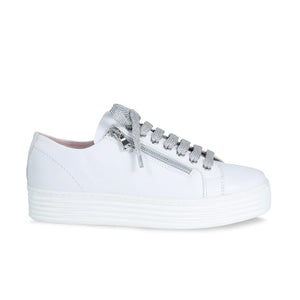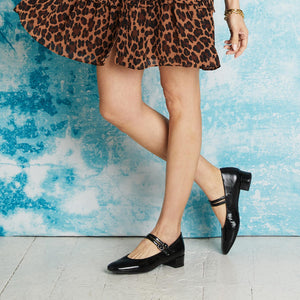
SHOP NOW
What are the best ways to treat bunions without surgery?
If you suffer with bunions, you may have considered having surgery on your feet. While bunion removal surgery is the only sure way to get rid of a bunion, there are plenty of methods for treating bunions without surgery. It is estimated that 23% of all adults aged 18-65 have bunions with 35.7% of all over-65s suffering. And of course, not all of these people are treating their bunions with surgery! If you are looking for bunion relief and wondering how to fix bunions without surgery, these 10 top tips are sure to help.
How Do Bunions Develop?
A bunion is a bony lump which forms at the base of the big toe. It occurs when the big toe moves inwards towards the second toe, as the first metatarsal shifts outwards towards the opposite foot.
The main causes of bunions are genetics, biomechanics, pregnancy, obesity and poorly-fitting footwear. Follow this link to read more about how bunions form.
If you are one of the millions of women looking for bunion relief, then read on to learn how to treat bunions.
How To Treat Bunions Without Surgery
Our 10 top tips on treating bunions without surgery:
- Massage and exercise your feet
- Take a paracetamol
- Soak your feet in a foot bath
- Ice your feet
- Put your feet up!
- Try castor oil
- Try bunion pads
- Try bunion splints
- Maintain a healthy weight
- Visit a doctor
- Wear Bunion-friendly shoes
- Ensure you are wearing the correct size shoes
- Use shoe inserts or orthotics for extra support

Pixie: White Leather & Denim Suede - Trainers for Bunions
SHOP NOW
1. Massage and Exercise Your Feet
One of the simplest ways to treat your bunions without surgery is to, in fact, exercise your feet. You should dedicate a few minutes to your feet every day. After long periods of standing or walking, there are very simple exercises you can do to relieve the pain associated with bunions. A simple massage or foot exercise can provide some much-needed bunion relief and will help strengthen the muscle which controls your big toe.
One of the best exercises for bunion relief is the toe stretch. All you need to do is point your toes straight ahead for 5-10 seconds and then curl them for 5-10 seconds. Repeat this stretch 10 times. You can also use a towel to help with this stretch. Lay out a small towel on the floor and curl your toes around it. Then pull the towel towards you. You can repeat this stretch 10 times too.

Orla: Black Leather - Square Toe Flats for Bunions
SHOP NOW
Another easy exercise to stretch your big toe involves using one hand to gently pull the big toe over into the proper alignment. Hold the big toe in this position for 10 seconds and then gently release. Repeat this exercise 3 times.
It is important to wiggle your toes throughout the day. Your feet are squeezed into shoes for an average of ten hours a day. Take your shoes off for couple of minutes and let them move to improve the blood circulation to your feet. (Of course, it's always better to wear bunion-friendly shoes which do not squeeze your feet!)
These foot exercises provide a simple way to treat the pain of bunions without surgery. They will not get rid of this painful joint but they will provide some bunion relief.
2. Take a Paracetamol
If your bunions are causing you pain, authorities such as the NHS advise on taking paracetamol or ibuprofen. This type of anti-inflammatory drug is not the solution to healing bunions without surgery, but they will provide some pain relief.
3. Soak Your Feet in a Foot Bath
Treat your feet to a foot bath a few times a week. The best way to treat bunions without surgery is to maintain a healthy footcare routine. The better care you take of your feet, the less likely you are to suffer with foot problems.
A simple 15-minute foot bath will relax your feet. Use warm water and Epsom Salt if you experience swelling or Pink Himalayan Sea Salt to relax and soothe your bunions.
4. Ice Your Feet
If you need bunion relief after a long day of walking or standing, icing your feet can reduce swelling and ease the pain of bunions. Put an ice pack in a towel and apply it to the designated area and ice for 15-20 mins for optimum affect.
Icing your feet and taking foot baths will not heal your bunions without surgery. However, they will certainly provide bunion relief if your feet are hurting you after a long day of exercising your feet.
5. Put Your Feet Up!
Another simple change you can make to help treat your bunions without surgery is to change the position in which you rest your feet. After sitting down in the same position for a long period of time, it is recommended to prop your feet at a 45 degree angle for 2-5 minutes at the end of a long day to increase blood circulation and reduce pain or swelling. Our top tips:
-
Lay down and make yourself comfortable on the floor, bed or sofa.
-
Elevate your legs by using a stack of pillows.
-
Make sure you keep your feet above your head and heart.
-
Ensure your safety and be careful that your position will not cause a back or neck injury.
You should also remember to take short breaks to rest your feet during the day. Walking or standing all day puts pressure on your toe joints, so it's important to put your feet up and rest them throughout the day.

Sprint: Navy Leather & Denim - Wide Trainers for Bunions
SHOP NOW
6. Try Castor Oil
How do you reduce your bunions naturally? Castor oil is a great way to treat bunions at home when you are suffering with painful bunions and difficult joints. Castor oil contains anti-inflammatory properties which help reduce bunion pain, increase blood circulation and helps reduce swelling!
To get the most out of your castor oil treatment, we recommend using a homemade foot wrap soaked in the oil which you can leave on your feet overnight! You can also purchase specialised foot wraps for castor oil online.
7. Try Bunion Pads
There are a number of bunion products out there which can help with treating bunions without surgery. Not all bunion products will help all feet, but it may be worth trying out bunion pads. These generally come in the form of soft gel-filled pads which you can put inside your shoe to stop the bunion from rubbing against the inside of your shoe.
You may also want to try shoe inserts which are designed to hold your foot in the correct position. You can buy these over the counter at your local pharmacy or you can have your orthotic insoles custom-made to accommodate your foot shape.
The purpose of these pads and inserts is to hold your foot in the correct position and prevent the bunion from rubbing and causing you pain. If your bunions do not hurt you when you are not wearing shoes, then this may be a good alternative treatment to bunion surgery.
8. Try Bunion Splints
Aside from surgery, there are no sure-fire ways to remove bunions - but can bunions be corrected without surgery?
Bunion Splints and other bunion-correcting products aim to realign the shape of your foot by stretching or straightening the big toe to its intended position and away from the other toes.
We would recommend opting for bunion splints which are intended to be worn at home or while you sleep. You shouldn't expect to see overnight success with a bunion corrector - it may take a week until you see any improvements.
Bunion Splints will not heal your bunions without surgery (you can read more about bunion splints and our bunion splint review here) but they may provide some bunion relief and help you treat your bunions at home.

Swirl: Rose Suede - Wide Fit Trainers to Help Bunions
SHOP NOW
9. Maintain a Healthy Weight
If you're wondering how to treat bunions at home, there's another important factor to consider. To treat your bunions without surgery, it is important to keep your body in good shape. Our feet are under a lot of pressure to support the rest of our body and simple activities such as walking and standing can cause great strain to our feet if they are carrying more weight than they need to.
If your toe joints are under greater pressure, they are more likely to become inflamed and sore, and this can worsen a bunion. Therefore a great first step to treating bunions without surgery is to maintain a healthy weight.
10. Visit a Doctor or Podiatrist
While there are many ways to treat your bunions yourself without surgery, you may want to visit a doctor or a podiatrist to discuss the other options available to you. There are non-surgical therapies which a professional may be able to provide, for example electrical stimulation which can decrease inflammation around the bunion.
Doctors may be able to take an X-ray for you so that you can see what is happening on your feet. An X-ray will also help you monitor whether your bunion is growing and needs surgery or not.

Montana: Black Suede - Boots for Bunions
SHOP NOW
11. Wear Bunion-Friendly Shoes
This is our main piece of advice for treating bunions without surgery. If you have bunions, you can still wear pretty, fashionable shoes. They just need to be bunion-friendly! You need to look for shoes which have a wide toe-box (the part at the front of the shoe) and cushioning to protect those difficult joints.
Although it might seem obvious to some, wide-fit shoes are often mistaken for shoes for bunions. The truth is that, while many wide-fit shoes have enough room to accommodate bunions, if you don’t have wide feet the back of the shoe will not hold your heels in place. It is also common to have a bunion on only one foot - therefore, wide fit shoes on a slim-to-normal width foot - without a bunion – will not be supportive and can lead to foot health issues in the future.
Sole Bliss took this into consideration when designing our collection of bunion shoes. We offer wide-fit shoes for bunions and regular-fit shoes for bunions. If you have a bunion on one foot, there is a cleverly hidden stretch panel inside the shoe that will accommodate and cushion your bunion. The other shoe won’t use the stretch panel and will function as an ordinary shoe, and that foot will simply enjoy the comfortable cushioning of the shoe. Clever right?

Valencia: Taupe Suede & Snake - Heeled Shoes for Bunions
SHOP NOW
12. Ensure You Are Wearing The Correct Shoe Size...
This sounds obvious however so many people get it wrong! At Sole Bliss, we like to ensure you are getting the best fitting advice possible as many people tend to wear shoes that do not fit their feet properly. When looking for other ways to reduce your bunions, and to help feel more comfortable in shoes, we would recommend getting your feet measured by a professional.
You can often tell if a shoe is too big or too small by it slipping at the heel or if it feels like your toes are being crushed inside. We find that, to get the perfect fit, you should have a thumb width of room in the toe area, but a snug fit around the heel so the shoe doesn't slip. Sole Bliss offer half sizes in the majority of our shoes as many people may be in-between sizes!
13. Use Shoe Inserts Or Orthotics For Extra Support.
If you suffer with painful foot conditions like bunions and other difficult joints, you may be wondering about needing extra support in your shoes to help alleviate pain and pressure. Custom made orthotics and shoe inserts can definitely help reduce pain and inflammation that your bunions may cause.
Specially made orthotics and shoe inserts help reduce pressure and pain by supporting the arch the foot, reducing pressure on your big toe joints. You should also avoid shoes without arch support. It's time to get rid of your flip-flops, which offer no support for problematic feet.
Bunion Surgery?
Following from the best ways to naturally reduce your bunions, it may be worth looking into more invasive ways to treat your bunions if the options above have not worked well for you. Everyone is different and alternative options will work differently for everyone.

Tanner: Black Leather - Extra Wide Loafers for Painful Feet
SHOP NOW
Bunion surgery, also known as a bunionectomy, is a surgical procedure that corrects the deformation of the big toe joint. In simpler terms, a bunion operation involves removing the large portion of the bone, cutting and realigning this to the correct position of tendons and ligaments. Sometimes if this isn't able to be done due to joint damage, you may need to look into a different procedure called a toe fusion.
FAQ:
How Can I Walk Comfortably With Bunions?
To walk comfortably with bunions, your main consideration should be finding the appropriate footwear. As covered above, these should be properly fitting shoes with a wide toe box, low heel and good arch support, avoiding narrow toe boxes that will constrict and aggravate bunions.
You can also use gel inserts or bunions pads to help you walk comfortably with bunions, as these will cushion the area and reduce pressure on the joint. Additionally, shoes built with sufficient underfoot cushioning can provide the same service. We have taken this into consideration when designing our shoes, as every pair of Sole Bliss shoes for bunions features triple-layered memory foam cushioning to comfort and support bunions!
Does Walking Barefoot Improve Bunions?
In some cases, walking barefoot can help to improve mild bunions by allowing your foot muscles to strengthen and align more naturally, but it must be done in moderation and on soft surfaces such as sand or grass. However, it is not a guaranteed solution, and walking barefoot on hard surfaces for extended periods can actually exacerbate the pain and discomfort of bunions. Additionally, if you already have bad bunions or significant foot misalignment, walking barefoot could worsen bunions.
It is always recommended to consult a podiatrist or healthcare professional before relying on walking barefoot to manage bunions.
Does Walking A Lot Make Bunions Worse?
Yes, walking a lot can make bunions worse, as the constant movement of the joint can aggravate bunions and put pressure on the big toe. The bunion can also rub against your shoe and become sore, especially if you have ill-fitting footwear. Standing on your feet for long periods is also to be avoided.
This doesn't mean you have to stop walking altogether though! Exercise is an important part of keeping up a healthy lifestyle - just try to go for shorter walks in moderation, and make sure you wear the proper footwear that has a wide toe box to avoid rubbing. Sole Bliss shoes are a great option, as they also feature a stretch panel in the side of the shoe where bunions are located, preventing rubbing or aggravation of any kind as you walk.

Sprint: White Leather & Denim - Ladies Trainers for Bunions
SHOP NOW
Can You Straighten A Bunion Without Surgery?
Unfortunately, there is no way to straighten bunions without surgery. Non-surgical measures can be taken to help manage bunions, such as wearing the correct footwear for bunions and using orthotics, padding, bunions splints and toe separators. If your bunions are causing you pain, it is recommended to see a podiatrist to discuss your options.
Should You Rub A Bunion?
Whilst directly rubbing a bunion is not recommended, it can be beneficial to massage the area around the bunion to help stretch the muscles, improve flexibility and alleviate pain. Focus on areas surrounding the bunion, including the calf, shin and the arch of your foot, using gentle movements. Be mindful of your pain tolerance and avoid any aggressive pressure or rubbing bunions themselves.
Are Flip Flops Good For Bunions?
Traditional flip-flops are not a good type of shoe to wear if you have bunions. It may seem like a good option, as flip-flops are open and so there is no material to rub against bunions. But in fact, their lack of support and the way they are worn, forcing toes to grip the sole, can stress and irritate the already vulnerable big toe joint where bunions develop.
People with bunions should wear footwear that offers the support needed to reduce the pressure exerted on the big toe joint when standing or walking, and flipflops do not have that support. So what shoes can you wear when it's hot and you want top enjoy a day at the beach or by the pool?
Sole Bliss Sandals for bunions feature contoured memory foam cushioning across the whole footbed to support the entire length of your foot. Soft leather uppers keep the foot in place whilst the Bunion Bed located inside the wide toe box stretches to comfortably accommodate bunions and avoid rubbing. Additionally, some styles offer straps for extra security and to relieve pressure from the front of the foot. Stylish and comfortable, our sandals are perfect for sunny days!

Bailey: White Leather - Flip Flops For Bunions
SHOP NOW
To Summarise…
There are many ways to treat your bunions without surgery. Bunion surgery (known as the "Bunionectomy") is a very serious procedure and you should explore all the options available to you before you decide to undergo surgery.
The best way to manage your bunions without surgery comes down to the type of footwear you wear and whether they support and accommodate your feet and bunions. Look for shoes designed for bunions and take your time selecting the most comfortable fit for you. You can manage pain and swelling with several natural techniques that we have suggested above.
To discover our full collection of bunion-friendly shoes, click here.


 USA
USA





















